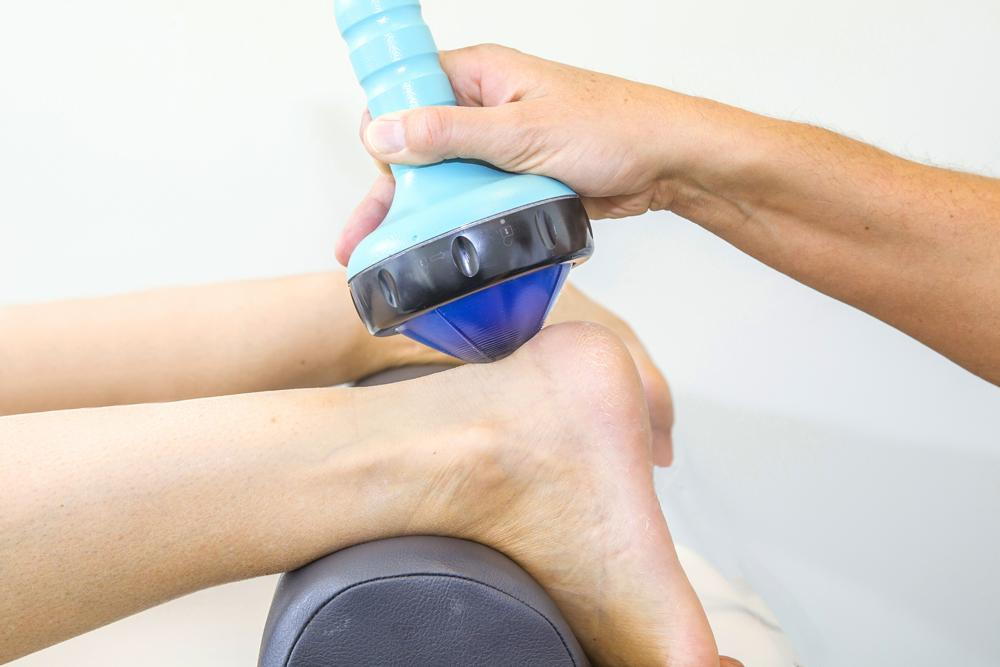Shockwave Therapy For Plantar Fasciitis

- posted: Apr. 30, 2024
Shockwave Therapy for Plantar Fasciitis In New Albany, IN
Plantar fasciitis is a common foot condition characterized by inflammation of the plantar fascia—a band of tissue spanning the bottom of your foot, linking your heel bone to your toes. The hallmark of this condition is the onset of heel pain, typically more pronounced and noticeable during the morning hours.
In recent decades, shockwave therapy has emerged as a non-invasive treatment option for plantar fasciitis.
Shockwave therapy uses high levels of targeted acoustic energy to stimulate increased blood flow and growth hormones to the area, promoting new tissue growth.
Serving Floyd Knobs, New Albany, Jeffersonville, Clarksville & beyond, 1st Choice Health & Wellness is proud to offer shockwave therapy for our Floyd County patients suffering from foot & heel pain related to plantar fasciitis.
Learn more about shockwave therapy and its numerous benefits for alleviating pain associated with plantar fasciitis.
What Is Plantar Fasciitis?
Plantar fasciitis is a common cause of plantar heel pain in patients. This condition arises when the plantar fascia ligament undergoes irritation, inflammation, thickening, and intense discomfort. The plantar fascia, a robust fibrous structure, extends along the underside of the foot, linking the heel bone to the toes at the ball of the foot. Its primary role is to facilitate the distribution of forces and weight during walking while providing support to the foot's arch.
Plantar fasciitis causes a sharp, hot, stabbing pain at the plantar aspect of the heel (the part where the ligament attaches to the heel bone). Patients note that this pain is more pronounced in the mornings upon rising or after periods of rest.
Who Is Most At Risk For Getting Plantar Fasciitis?
Several factors can increase the risk of developing plantar fasciitis. Individuals who may be more susceptible include:
Age: Plantar fasciitis commonly affects individuals between the ages of 40 and 60.
Certain Physical Activities: Activities that involve prolonged standing, walking, or running on hard surfaces, as well as those that put excessive stress on the feet, can contribute to the development of plantar fasciitis.
Foot Mechanics: Abnormal foot mechanics, such as high arches, flat feet, or an abnormal walking pattern, can increase the strain on the plantar fascia.
Obesity: Excess weight can put additional stress on the plantar fascia, increasing the likelihood of inflammation and pain.
Occupations: People in occupations that require long hours of standing or walking, such as teachers, factory workers, or healthcare professionals, may have an elevated risk.
Footwear: Wearing shoes with inadequate support or improper fit can contribute to the development of plantar fasciitis.
Tight Achilles Tendon: A tight Achilles tendon or calf muscles can affect the flexibility of the foot and contribute to increased strain on the plantar fascia.
What Is Shockwave Therapy?
Also recognized as extracorporeal shockwave therapy (ESWT), Shockwave therapy is a therapeutic tool used to reduce pain and promote healing in bone, tendon, ligament and fascia in patients with musculoskeletal disorders.
A healthcare professional uses a hand-held probe to apply high energy acoustic waves to the affected area of your body. The energy promotes tissue healing and regeneration, stimulates blood flow to the area, and can dramatically lessen pain.
It’s an ideal alternative for people who may not want to take medication or undergo surgery.
The Benefits of Shockwave Therapy for Plantar Fasciitis Treatment: What The Research Shows
There are various clinical studies and research suggesting the effectiveness of shockwave therapy in treating plantar fasciitis, as well as reducing pain for plantar fasciitis sufferers.
A Cochrane review concluded shockwave is an effective treatment for plantar fasciitis. Noteworthy impacts on pain and function have been documented within 3-5 treatment sessions (Higgins JP, Altman DG, Sterne JA., 2017)
This randomized controlled trial concluded that shockwave therapy was effective in providing relief for individuals with plantar fasciitis, and the benefits were maintained over the medium term.
What To Expect During A Shockwave Therapy Session For Plantar Fasciitis Treatment At Our New Albany Clinic
Here's what you can anticipate during this noninvasive outpatient procedure at our local chiropractic office designed to ease your heel pain:
1. Arrival & Preparation:
-Upon reaching the facility, you will remove your socks and shoes.
-Find comfort lying flat on a cushioned table, stomach down, legs gently cradled by a supportive pillow. Your foot rests on the machine while you lie back comfortably.
2. Ultrasound Gel Application:
-Ultrasound gel is skillfully applied to the heel, laying the groundwork for the shockwave therapy procedure
3. Specialized Shockwave Delivery:
-Our health care provider uses a specialized probe to deliver air sound waves onto your heels. The probe is moved around the heel. You will feel light pressure and vibration around the affected area. After treatment is finished, which takes around 10 minutes per foot, patients typically report a feeling of immediate pain relief. Between 3-5 shockwave sessions are required for a significant resolution of pain.
Book An Appointment With Our Plantar Fasciitis Doctors In New Albany, Indiana Today
Are you grappling with persistent heel pain or seeking effective plantar fasciitis treatment in the New Albany, Indiana area? Our dedicated team at 1st Choice Health & Wellness is here to support patients of all ages throughout Floyd & Clark County, including Jeffersonville, Floyd Knobs, and Clarksville. Take the first step towards a pain-free life by calling us at (812) 945-4500 to schedule an appointment.
Location
Find us on the map
1st Choice Health & Wellness
2441 State St #10
New Albany, IN 47150
Hours of Operation
9:00 am - 12:00 pm
2:00 pm - 6:00 pm
2:00 pm - 6:00 pm
9:00 am - 12:00 pm
2:00 pm - 6:00 pm
9:00 am - 12:00 pm
2:00 pm - 6:00 pm
9:00 am - 1:00 pm
Closed
Closed

